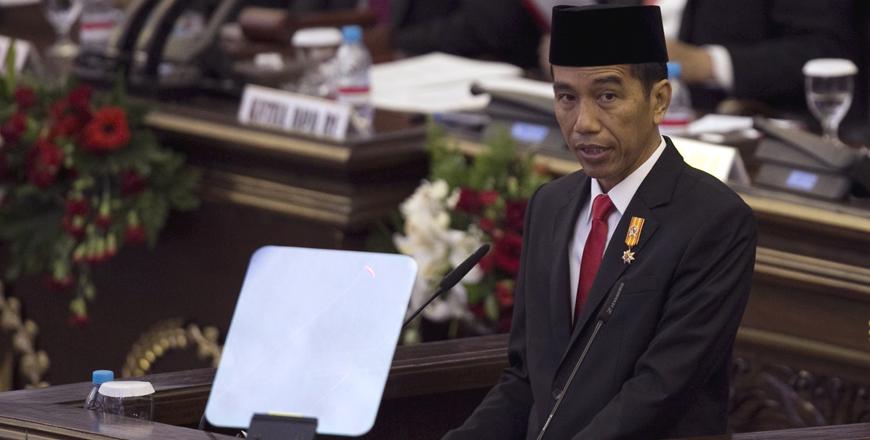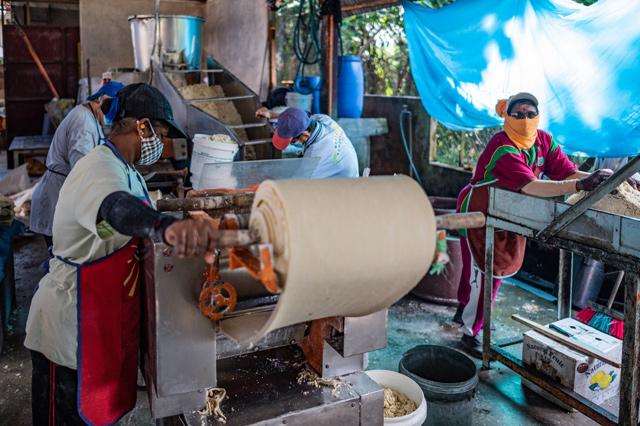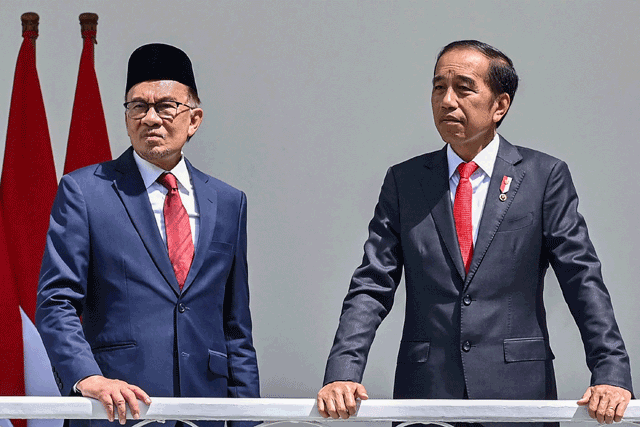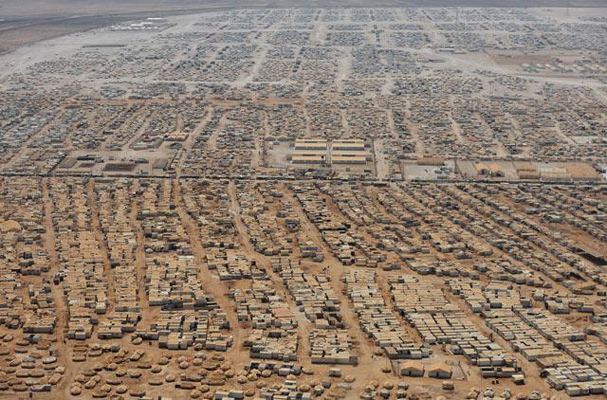You are here
Indonesian migrants' remittances fail to develop economy at home — study
By Reuters - Aug 16,2015 - Last updated at Aug 16,2015

Indonesian President Joko Widodo addresses members of parliament in Jakarta, Indonesia, on Friday (Reuters photo)
BOGOR, Indonesia — In a small, farming district in Indonesia's West Nusa Tenggara province, thousands of women leave home each year to cook, clean and take care of children for families in the Middle East.
The migrant domestic workers of Sumbawa district, with about 400,000 residents, sent home nearly $100 million over the past five years, paying for new, modern homes and mobile phones, as well as education and healthcare, researcher Gregory Randolph indicated.
Yet for all the money pumped into Sumbawa district by generations of people who have left to work abroad over the past half century, people continue to leave for lack of opportunities at home, Randolph said at the launch of his study on migrants' communities of origin.
"Labour migration simply is not delivering economic development to communities of origin," Randolph added on Wednesday at the close of a three-day conference on migrant labour in Bogor.
"Whatever benefits migration and remittances might deliver ... they have not included the type of development that creates good jobs. This was confirmed time and time again in the interviews I did in West Nusa Tenggara," he elaborated.
The province lies in the south and centre of the Indonesian archipelago.
There are an estimated 250 million migrant workers globally, who are expected to send home about $440 billion in remittances this year, according to the World Bank.
Remittances remain a key source of funds for developing countries, far exceeding official development assistance and even foreign direct investment, the World Bank says.
In the 1980s Indonesia even began including migration in its economic plans, putting "manpower services export" as one of its top priorities in its 1994-1999 plan, Randolph wrote in his study.
Between 2006 and 2013, more than 50,000 people from Sumbawa left for jobs overseas, Randolph wrote, almost all of them women leaving for domestic work.
He found that migrants' greater spending on education and healthcare for their families had not created stable local jobs, or shifted better-educated young people towards high-skilled migration.
"Remittances do not positively impact anyone except the migrant and his or her family, and even then, the impacts do not alleviate the need for future generations to migrate," he said in the report.
The problem, he indicated, is that there is no effort to channel remittances into the economic development of home communities.
"Governments are more likely to see migrants as consumers in their origin communities... they send money back that can be spent, or they bring money back and spend it. Governments for the most part cannot imagine that migrant workers can also be producers in most communities," he added.
In addition to focusing on migrant labour exploitation and protection, Randolph urged the 200-plus migration and labour experts at the conference to consider economic development in the migrants' origin communities.
"We really need new models and new ways of imagining how the hard work that migrants do abroad can bear fruit in their home communities," he said.
"We could help migrant workers pool their resources and set up cooperatives or producer companies... they might actually be able to lead the effort to replace the old broken paradigm of development... with a new one that empowers migrant communities and makes migration a choice rather than a compulsion," he added.
He pressed the government to train migrants in management and investment of their remittances, and to develop models of collective investment by which migrants can pool savings to start small- and medium-sized enterprises.
In the report, Randolph proposed that Sumbawa, which has seen a tenfold increase in corn yields over the past decade, might develop agro-processing businesses, rather than shipping out its raw crops for processing elsewhere in Indonesia.
Separately, Indonesian President Joko Widodo on Friday called on bureaucrats and politicians to set aside their egos and work together to revive an economy whose growth has slumped since he took office last October.
In a state-of-the-nation address, he took a swipe at bickering across government agencies and political parties that has hamstrung his administration and disappointed both investors and voters who had high hopes he would turn the economy around.
"To overcome the issues this country is currently facing we have to work shoulder to shoulder. We should not be divided by political or short-term interests," he told parliament in a speech.
"The erosion of a culture of mutual respect and tolerance in official institutions such as law enforcement agencies, communities, media and political parties, is causing this country to be caught in a web of egos," the president said.
Widodo also unveiled in a separate speech his proposed budget for 2016, in which he promised 5.5 per cent growth, which was seen by economists as overly optimistic.
"It's hard to see Indonesia getting close to growth of 5.5 per cent next year, given that commodity prices are likely to remain low and monetary policy relatively tight," said Dan Martin at Capital Economics.
"The main hope is that the infrastructure drive takes off, but implementation and bureaucratic problems will inevitably stand in the way," he added.
Widodo, whose government has struggled to disburse funds for roads, ports and power stations, pledged an 8 per cent increase to 313.5 trillion rupiah ($22.74 billion) in spending in infrastructure in the hope that it would have a knock-on effect on investment and consumption growth.
Economic growth slipped to 4.67 per cent, its slowest pace in six years, in the second quarter amid drooping domestic demand and sliding prices for coal and commodities, key earners for the country.
The rupiah has dropped nearly 10 per cent against the dollar this year to trade at 17-year lows and is Southeast Asia's worst performer after Malaysia's ringgit.
The first Indonesian president to come from outside the military or political establishment, the former furniture businessman won last year's election in large part because he was seen as someone who cared for issues facing ordinary people.
But after 10 months in office, many of Widodo's economic programmes have struggled to get off the ground.
The 54-year-old president last week hit the reset button on his government, replacing two key economic ministers and installing two experienced technocrats who are expected to improve policy coordination and dispel concerns that Indonesia is taking a protectionist turn to shield its economy.
However, some analysts doubt that Widodo is willing to embrace radical reforms that could prove unpopular.
"Prospects for some economic reforms do now exist to some extent with the new Cabinet... but he's not inclined to institutional reform because he's still not emphasising issues such as land acquisition and civil service reform," said political analyst Kevin O'Rourke.
"With worsening economic conditions and continued neglect of reforms, I think the outlook remains grim," he added.
Related Articles
JAKARTA — Indonesia is developing vast farm estates across the archipelago — an area 10 times the size of neighbouring Singapore — to counte
BOGOR, Indonesia — Malaysia’s new prime minister met with Indonesia’s president on Monday on his first foreign trip after winning a confiden
AMMAN — Jordan is facing a challenge in dealing with migration due to the involvement of several entities dealing with the issue, which hind

















